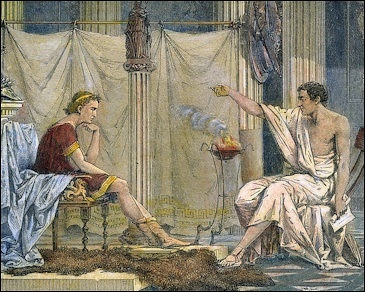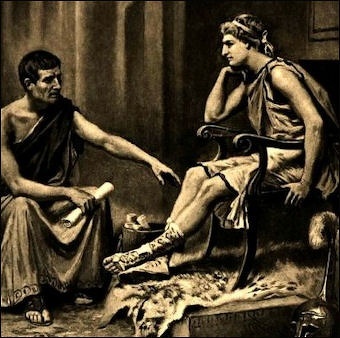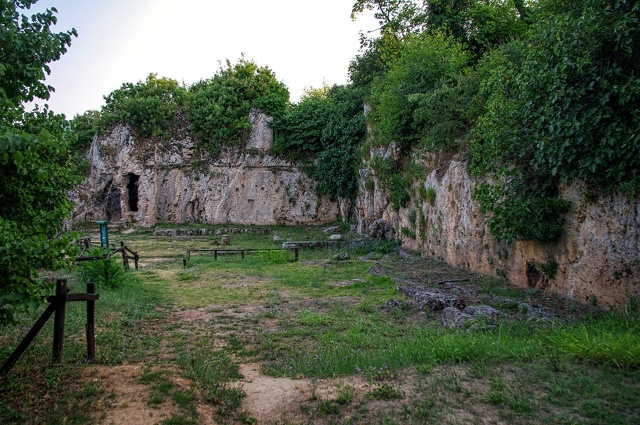Home | Category: Alexander the Great
ARISTOTLE AND ALEXANDER THE GREAT

Alexander and Aristotle
Aristotle tutored Alexander from age 13 to 16 beginning in 343 B.C., when Aristotle was in his early 40s. Up that time Aristotle had spent most of his life at Plato’s Academy in Athens. He was there from age 17 to 37. Aristotle left the Academy shortly after Plato died in 348 B.C. Aristotle lived until 322 B.C. The time he spent in Athens, between 335 and 323 B.C., after teaching Alexander, is when Aristotle is believed to have composed most of his famous works.
Richard Grant wrote in Smithsonian magazine: “It was Philip’s idea" to hire Aristotle. "Alexander, was a bold, headstrong boy of unusual intelligence. There was a connection between the two families: Aristotle’s father had been a friend and court physician to Philip’s father, Amyntas III. There was also bad blood: Philip had razed Aristotle’s hometown of Stagira six years previously and sold most of its inhabitants into slavery. Nonetheless, the two men came to an agreement. Aristotle would instruct Alexander, and in return Philip would rebuild Stagira and resettle its citizens there. [Source: Richard Grant, Smithsonian magazine, June 2020]
Aristotle was well paid. Philip also helped Aristotle in his studies of nature by assigning gamekeepers to tag wild animals for him. After Alexander became king of Macedonia he gave Aristotle a lot of money so he could set up a school. While he was in Macedonia, Aristotle made friends with the general Antipater, who ran Macedonia while Alexander was on his campaign of conquest. The friendship was close enough that Antipater was the executor of Aristotle's will. Aristotle no doubt received some financial assistance from him as well.
Alexander had a deep love for Greek literature. He reportedly loved to recite passages from the plays of Euripides from memory. Plutarch wrote: "He regarded the Iliad as a handbook of the art of war and took with him on his campaigns a text annotated by Aristotle, which he always kept under his pillow together with a dagger." In the end Alexander proved more open minded than Aristotle, who tended to view non-Greeks as barbarians.
RELATED ARTICLES:
ALEXANDER THE GREAT (356 TO 324 B.C.) europe.factsanddetails.com ;
ALEXANDER THE GREAT'S MARCH OF CONQUEST europe.factsanddetails.com ;
ALEXANDER THE GREAT’S APPEARANCE, CHARACTER, PERSONALITY AND HABITS factsanddetails.com ;
ALEXANDER THE GREAT’S EARLY LIFE factsanddetails.com ;
PHILIP II (ALEXANDER THE GREAT’S FATHER) europe.factsanddetails.com ;
OLYMPIAS (ALEXANDER’S THE GREAT'S MOTHER) europe.factsanddetails.com
ALEXANDER THE GREAT’S PERSONAL LIFE: WIVES, FRIENDS, LOVERS, CHILDREN europe.factsanddetails.com ;
ALEXANDER BECOMES KING OF MACEDONIA AND THE ELIMINATION OF RIVALS AND THREATS europe.factsanddetails.com ;
ALEXANDER THE GREAT AND HIS ARMY: LEADERSHIP, TACTICS, WEAPONS, SUPPLY LINES, FOOD europe.factsanddetails.com ;
PLOTS, SUSPICIONS, INTRIGUES, MURDERS, EXECUTIONS AND ALEXANDER THE GREAT factsanddetails.com ;
ALEXANDER THE GREAT’S DEATH europe.factsanddetails.com
RECOMMENDED BOOKS:
“The Young Alexander: The Making of Alexander the Great”
by Alex Rowson Amazon.com;
“Rhetoric to Alexander” (Illustrated) by Aristotle and Aeterna Press (2015), of dubious origin Amazon.com;
“Fire from Heaven” by Mary Renault (1969), Novel About Young Alexander, Amazon.com;
“Child of a Dream” by Valerio Massimo Manfredi (1998). Novel Amazon.com;
“Philip II of Macedonia: Greater Than Alexander” by Richard A. Gabriel, Illustrated, (2010) Amazon.com;
“Philip II of Macedonia” by Ian Worthington (2010) Amazon.com;
“Alexander the Great” by Philip Freeman (2011) Amazon.com;
“Alexander of Macedon” by Peter Green (1974) Amazon.com;
“The Nature of Alexander” by Mary Renault (1975) Amazon.com;
“Alexander the Great” by Robin Lane Fox (1973) Amazon.com;
“Alexander the Great: The Story of an Ancient Life” by Thomas R. Martin (2012) Amazon.com;
“Alexander the Great” by Paul Cartledge (2004) Amazon.com;
“History of Alexander” by Quintus Curtius Rufus (Penguin Classics) Amazon.com;
“The Life of Alexander the Great” by Plutarch (Modern Library Classics) Amazon.com;
What Aristotle Taught Alexander the Great

Aristotle tutoring Alexander
Philip II of Macedonia had hired Aristotle to teach science and politics to his son, Alexander. During Aristotle's time in the Macedonian court, he gave lessons not only to Alexander but also to two other future kings — Ptolemy and Cassander — and likely Alexander’s best friend Hephaestion. Little is known about what transpired between Aristotle and Alexander. Neither had much to say about the other afterwards and some say neither seem to have much influence on the other. But others say they did influence each other. Aristotle egged Alexander on to conquer the east. Aristotle's own attitude towards Persia was unashamedly ethnocentric. In one famous quote, he tells Alexander to be "a leader to the Greeks and a despot to the barbarians, to look after the former as after friends and relatives, and to deal with the latter as with beasts or plants". [Source Wikipedia]
Another thing that Aristotle was recorded as saying was: “the young man is not a proper audience for political science. He has no experience of life, and because he still follows his emotions, he will only listen to purpose, uselessly." Aristotle appears to have written some pamphlets especially for Alexander. They include On Kingship and In Praise of Colonies. The reason Philip chose Aristotle to be Alexander's teacher is not clear. Aristotle was not a well known philosopher at that time. His father served as court physician for Philip's father (Alexander's grandfather) and perhaps Philips choice was a political move aimed at rebuilding Stagira. Aristotle taught Alexander until he was made a regent while his father Philip was in Asia Minor.
Richard Grant wrote in Smithsonian magazine: “For the three years, Aristotle, a curmudgeonly figure who had small eyes, wore many rings and spoke with a lisp, tutored Alexander in biology, ethics, literature, mathematics, medicine, philosophy, politics, rhetoric and zoology. Plutarch describes the two of them sitting on the stone benches and discussing philosophy, and strolling through nearby orchards and vineyards. Modern guidebooks and history books repeat this romantic description, much to annoyance of historian Angeliki Kottaridi. “It is idiotic!” she says. “From 13 to 16, Alexander and his peers learned how to fight. They would have done this in a gymnasium, a combination of school and military academy, with different areas to sleep, eat, study and fight. There is no evidence of facilities like this...There is no room for them!” [Source: Richard Grant, Smithsonian magazine, June 2020]
Plutarch on Alexander the Great and Aristotle
Plutarch wrote in “Life of Alexander”: Philip “sent for Aristotle, the most celebrated and learned of all the philosophers; and the reward he gave him for forming his son Alexander was not only honorable, but remarkable for its propriety. He had formerly dismantled the city of Stagira, where that philosopher was born, and now he re-built it, and reestablished the inhabitants, who had either fled or been reduced to slavery... Aristotle was the man Alexander admired in his younger years, and, as he said himself, he had no less affection for him than for his own father.” [Source: Plutarch (A.D. c.46–120), “Life of Alexander,” John Langhorne and William Langhorne, eds., “Plutarch's Lives,” Translated from the Original Greek. Cincinatti: Applegate, Pounsford and Co., 1874, pp. 434-439]
After this, considering him to be of a temper easy to be led to his duty by reason, but by no means to be compelled, he always endeavoured to persuade rather than to command or force him to anything; and now looking upon the instruction and tuition of his youth to be of greater difficulty and importance than to be wholly trusted to the ordinary masters in music and poetry, and the common school subjects, and to require, as Sophocles says-"The bridle and the rudder too," he sent for Aristotle, the most learned and most celebrated philosopher of his time, and rewarded him with a munificence proportionable to and becoming the care he took to instruct his son.
For he repeopled his native city Stagira, which he had caused to be demolished a little before, and restored all the citizens, who were in exile or slavery, to their habitations. As a place for the pursuit of their studies and exercise, he assigned the temple of the Nymphs, near Mieza, where, to this very day, they show you Aristotle's stone seats, and the shady walks which he was wont to frequent. It would appear that Alexander received from him not only his doctrines of Morals and of Politics, but also something of those more abstruse and profound theories which these philosophers, by the very names they gave them, professed to reserve for oral communication to the initiated, and did not allow many to become acquainted with.
“For when he was in Asia, and heard Aristotle had published some treatises of that kind, he wrote to him, using very plain language to him in behalf of philosophy, the following letter. "Alexander to Aristotle, greeting. You have not done well to publish your books of oral doctrine; for what is there now that we excel others in, if those things which we have been particularly instructed in be laid open to all? For my part, I assure you, I had rather excel others in the knowledge of what is excellent, than in the extent of my power and dominion. Farewell." And Aristotle, soothing this passion for pre-eminence, speaks, in his excuse for himself, of these doctrines as in fact both published and not published: as indeed, to say the truth, his books on metaphysics are written in a style which makes them useless for ordinary teaching, and instructive only, in the way of memoranda, for those who have been already conversant in that sort of learning.
“Doubtless also it was to Aristotle that he owed the inclination he had, not to the theory only, but likewise to the practice of the art of medicine. For when any of his friends were sick, he would often prescribe them their course of diet, and medicines proper to their disease, as we may find in his epistles. He was naturally a great lover of all kinds of learning and reading; and Onesicritus informs us that he constantly laid Homer's Iliads, according to the copy corrected by Aristotle, called the casket copy, with his dagger under his pillow, declaring that he esteemed it a perfect portable treasure of all military virtue and knowledge.
When he was in the upper Asia, being destitute of other books, he ordered Harpalus to send him some; who furnished him with Philistus's History, a great many of the plays of Euripides, Sophocles, and Aeschylus, and some dithyrambic odes, composed by Telestes and Philoxenus. For a while he loved and cherished Aristotle no less, as he was wont to say himself, than if he had been his father, giving this reason for it, that as he had received life from the one, so the other had taught him to live well. But afterwards, upon some mistrust of him, yet not so great as to make him do him any hurt, his familiarity and friendly kindness to him abated so much of its former force and affectionateness, as to make it evident he was alienated from him. However, his violent thirst after and passion for learning, which were once implanted, still grew up with him, and never decayed; as appears by his veneration of Anaxarchus, by the present of fifty talents which he sent to Xenocrates, and his particular care and esteem of Dandamis and Calanus.”
Influence of Aristotle on Alexander the Great
Richard Grant wrote in Smithsonian magazine: “Aristotle’s fascination with nature, and his belief in the scientific method, exerted a strong influence on Alexander, who took naturalists with him as he Marched his army across Asia. Alexander apparently sent their reports back to Aristotle, accompanied by flora and fauna samples. He also included scientists, engineers and philosophers in his retinue, and opened up intellectual contacts between East and West. When their student-teacher relationship ended in 340 B.C., Aristotle gave his own, annotated copy of the Iliad to Alexander, who carried the book to Asia and famously placed it under his pillow, next to his dagger, while he slept. [Source: Richard Grant, Smithsonian magazine, June 2020]
In one important regard, Alexander and Aristotle disagreed. The philosopher thought that all non-Greek people were barbarians and potential slaves. When Alexander started hiring foreigners in his army and administration, the relationship cooled. “Alexander wanted to expand the world and prove what a mixture of people can do and be,” says Graekos. “He wanted citizenship to mean the same thing for his subjects in Afghanistan and Persia as in Macedonia. This was anathema to Aristotle, who advised Alexander to treat people from other nations as you treat plants and animals.”
“Anthony Everitt, the British author of the recent biography Alexander the Great, agrees that Aristotle was a hard-core nationalist. Talking by phone, he jokingly compares the philosopher to a “Brexiteer.” But he disagrees with Graekos’ and Kottaridi’s portrayal of Alexander as a pan-ethnic idealist who wanted to bring races and creeds together. “Alexander was driven by the excitement of fighting, which he loved, and the Homeric idea that war brought glory,” he says. “Once he had defeated the Persian Empire, he needed a practical way of governing a vast territory with many different languages. His solution was to hire locals. Gradually this led to the blending of cultures.”
Where Did Aristotle Teach Alexander
Richard Grant wrote in Smithsonian magazine: “Nineteen miles from Aigai, just outside the village of Naoussa, lies a tranquil clearing with caves, springs and ancient carved limestone benches. This is Mieza, or Sanctuary of the Nymphs. When Plutarch came here in the second century A.D., locals told him that this was where Aristotle had tutored the young Alexander. Guidebooks and travel websites impart the same information to modern tourists, and road signs point the way to “Aristotle’s School.” [Source: Richard Grant, Smithsonian magazine, June 2020]
“In fact, Kottaridi’s colleagues have partially excavated the remains of a gymnasium seven miles away, near an ancient theater, and they have dated it to the time of Philip II. To the displeasure of the villagers in Naoussa, for whom “Aristotle’s School” has constituted a tourist attraction since the second century, local archaeologists now believe that Aristotle taught Alexander and probably 150 other students at this gymnasium. Philip likely built it in order to supercharge his elite warrior class, in preparation for his planned invasion of the Persian Empire.
“I visit the place with Ioannes Graekos, an affable archaeologist who used to work at Aigai and now oversees a museum in the nearby town of Veria. There isn’t much to see at the gymnasium site — a few old digs on a large area of overgrown land — because the excavation stalled for lack of funding. Nonetheless, Graekos is able to conjure up what once stood here: a massive two-story building with dining rooms, wrestling and fighting areas, and classrooms. “Alexander and Aristotle probably visited the Mieza sanctuary, because it was so close, and so pleasant, but the real schooling took place here,” he says.
Image Sources: Wikimedia Commons except Alexander's birth, Flicker.com
Text Sources: Internet Ancient History Sourcebook: Greece sourcebooks.fordham.edu ; Internet Ancient History Sourcebook: Hellenistic World sourcebooks.fordham.edu ; BBC Ancient Greeks bbc.co.uk/history/; Canadian Museum of History, Perseus Project - Tufts University; perseus.tufts.edu ; MIT Classics Online classics.mit.edu ; Gutenberg.org, Metropolitan Museum of Art, National Geographic, Smithsonian magazine, New York Times, Washington Post, Live Science, Discover magazine, Natural History magazine, Archaeology magazine, The New Yorker, Encyclopædia Britannica, "The Discoverers" and "The Creators" by Daniel Boorstin. "Greek and Roman Life" by Ian Jenkins from the British Museum, Wikipedia, Reuters, Associated Press, The Guardian, AFP and various books and other publications.
Last updated September 2024

